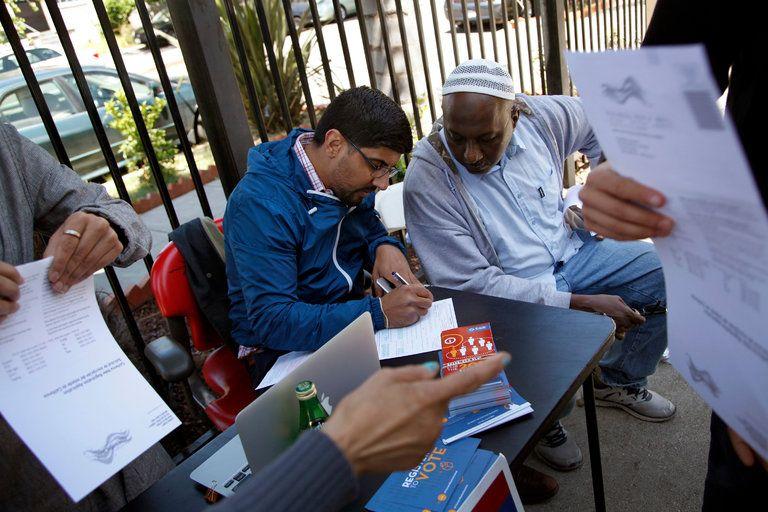The Council on American-Islamic Relations (CAIR) hosted its final voter registration drive in Silver Spring, Maryland on Fri, Oct. 12, as part of a massive statewide campaign called “Get Out The Vote” (GOTV).
The campaign, which launched on Sept. 13, 2018 is the first of its kind by CAIR and hopes to get as many Muslim voters as possible to the polls for the midterm election on Nov. 6. The campaign includes coordinating voter registration drives across Maryland masajd, the production of the first Maryland Muslim voter guide, organizing phone banking, and free workshops on civic and political engagement.
CAIR is the nation’s largest Muslim civil rights and advocacy organization. According to CAIR, anti-Muslim bigotry is on the rise and Muslims simply cannot afford to be anything but politically active. With so much at stake for the Muslim community, they believe it’s a crucial time for Muslims to vote and make their voices heard.
CAIR’s 2018 civil rights report finds that federal government agencies were responsible for 35 percent of all anti-Muslim bias incidents last year. Of those, 50 percent or 464 were a consequence of the Trump administration's unconstitutional “Muslim Ban” executive orders. The new report, titled "Targeted," also shows a 17 percent increase in anti-Muslim bias incidents nationwide and a 15 percent increase in hate crimes in 2017 over 2016.
Zainab Chaudry, CAIR Director of Maryland Outreach, is an activist who believes that every vote counts. Her goal for the GOTV campaign is not only to encourage American Muslims across the state to register to vote, but to make informed decisions at the polls when voting. “Often times,” says Chaudry, “American Muslims do not vote because they do not know who to vote for.” She was pleasantly surprised to discover that so many Muslims are already registered to vote, but do not vote simply because they do not know where the political candidates stand on issues that concern them. Others do not vote because they think their vote won’t make a difference. Chaudry aims to influence these community members by showing them that not only does their vote make a difference, but that the Muslim American constituency has the potential to be the decisive vote in close races.
This year CAIR partnered with United Maryland Muslim Council (UMMC) to provide American Muslims in Maryland with a voter guide that will facilitate the decision making process (downloadable link is available online). The goal, according to Chaudry was to show Muslims a united front-not just one, but two Muslim organizations coming together and encouraging other Muslims to be politically engaged. CAIR makes it clear, however, that as a non-partisan, non-profit 501c3 organization, they are unable to endorse a particular candidate. Instead, they encourage voters to do their homework and make informed decisions. The voter guide is mainly a resource for those who want to know how political candidates feel about key issues concerning them and get answers to frequently asked questions.
Within the voter guide is an introduction to the Maryland candidates. Political candidates’ names are listed in alphabetical order with their pictures beside them. Directly following this is a survey that asks the candidates to answer 10 questions concerning the Maryland minority communities since the 2016 presidential election. Some of those questions include the candidates positions on: the anti-Muslim travel ban executive orders, religious freedom for Muslim houses of worship, and the right to engage in the BDS movement. Candidates who chose to participate in the survey had the option of answering “S,” (support), “O,” (oppose), or “DA” (decline to answer). Also included in the voter guide is the Maryland congressional scorecard.
Chaudry says she spoke to many registered voters in the Maryland Muslim community. When she asked them why they did not vote in the last election many replied, “none of the candidates represented what I stood for,” or “I didn’t feel strongly about any of the candidates.” Chaudry hopes the voter guide helps community members get more insight into the candidates’ views on key issues that they care about.
One important message CAIR wants everyone to know is that there are voter suppression efforts, special interest groups, lobbyists, and organizations who don’t want American Muslims to exercise their right to vote.
Giving people the proper tools to make informed decisions, says Chaudry, empowers people and encourages them to be more politically engaged. “We have seen what the consequences can be of having elected officials in office who don’t necessarily speak to the interests of the Muslim community,” says Chaudry. She says the Muslim ban has impacted many Muslims in Maryland. One example she gave was that of a masjid in Maryland, which had to cancel ummrah trips to Saudi Arabia because some of the travelers were green card holders and there was a concern that they would not be allowed reentry in the United States.
One happy memory Chaudry recalled during the campaign was of registering a high school senior to vote and the joy on his face when she told him that because he would turn eighteen in October he was old enough to vote in the November election. The student was thrilled to know that he could participate in the election for the first time. Empowering people like him to vote is what the GOTV campaign effort is all about.










Comments powered by CComment